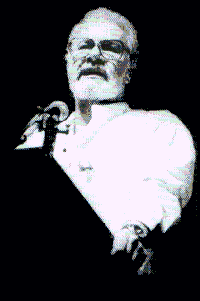

| 0n
February 2 1996, the Sydney Gay and Lesbian Mardi Gras Festival kicked
off at a ceremony on the steps of the 0pera House. There were lights, there
was music, but the highlight for many was the moving speech by Aboriginal
gay man, Noel Tovey. This is an excerpt from that speech.
"When Dennis [Watkins, Mardi Gras Festival Director] asked me to speak, I asked him what I would speak about. He said "speak about the changes you've seen in the last 60 years". One of the most significant changes I've seen, and one of which I am particularly proud, is that I am the first Aboriginal to be asked to address such an illustrious audience. I am also very proud to be able to speak on this spot, where the birth of Aboriginal culture began in NSW. "Although racism has never been a part of the gay and lesbian scene and community, I cannot say the same for the mother of a friend of mine. When I was very young I had a friend and she was going out with a young Sri Lankan boy. He was very black, and this outraged her white, middle class family. Within six months she decided to come out. She had an affair with - uhh - the best-known lesbian of my day. Her aunty found out about this and rang her mother and said, 'Did you know that Kathy is having an affair with a lesbian?' And her mother replied, 'Good god! What colour are they?!' "I was a street kid and by the age of 12 I was a highly skilled hustler on the streets. Growing up in those early years were fraught with danger, but the gay and lesbian community was a very close-knit family. Parties were held in secret, behind closed doors, where addresses given out were only whispered. "At only 17, I was arrested and taken down to the local police station and charged. I was told that if I pleaded guilty that I would be let off with a good behaviour bond and that they weren't interested in me, they were interested only in the person I was sleeping with - which I hadn't been. I had live minutes to decide, really, the rest of my life. "In that live minutes I decided I had had enough. For two reasons. First, I didn't think my sexuality was a crime. Secondly, I'd been pushed around by various legal institutions and committees since I was born. (I was taken away from my natural parents in 1939.) "So I decided that I would plead not guilty. This led to a very public trial and my name was in every newspaper in Australia. "I went to jail. "When I was released I was ostracised not only by the straight community but also by the gay community. I was branded. J was a criminal because of my sexuality and therefore some of my best friends were scared to be seen with me in public. "I knew I had to leave Australia to find a career. So I saved my money, though it took quite some time, and I went abroad. "I was in New York for the Stonewall Riots. I marched on the first pride march in London. I have watched the growth of the gay and lesbian community around the world, but nowhere is that growth more evident than right here in Australia. " The survival of any community relies on the strength, commitment and the pride of its members. Members who have the strength and pride to stand up and be counted, members who have the courage and political voice to stand up to demand equal rights for brother and sister, black and white. And above all [it depends upon] the ability to laugh when things look the blackest. "We have an Aboriginal saying which goes
like this: 'When things are black, they're funny.' "It is these strengths
and qualities that enable Mardi Gras to survive, to grow, to flourish into
the unique event in the world it has become."
KOORIvoice
|
